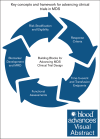Advancing drug development in myelodysplastic syndromes
- PMID: 39786387
- PMCID: PMC11914162
- DOI: 10.1182/bloodadvances.2024014865
Advancing drug development in myelodysplastic syndromes
Abstract
Myelodysplastic syndromes/neoplasms (MDSs) are heterogeneous stem cell malignancies characterized by poor prognosis and no curative therapies outside of allogeneic hematopoietic stem cell transplantation. Despite some recent approvals by the US Food and Drug Administration, (eg, luspatercept, ivosidenib, decitabine/cedazuridine, and imetelstat), there has been little progress in the development of truly transformative therapies for the treatment of patients with MDS. Challenges to advancing drug development in MDS are multifold but may be grouped into specific categories, including criteria for risk stratification and eligibility, response definitions, time-to-event end points, transfusion end points, functional assessments, and biomarker development. Strategies to address these challenges and optimize future clinical trial design for patients with MDS are presented here.
Licensed under Creative Commons Attribution-NonCommercial-NoDerivatives 4.0 International (CC BY-NC-ND 4.0), permitting only noncommercial, nonderivative use with attribution.
Conflict of interest statement
Conflict-of-interest disclosure: A.M.Z. participated in advisory boards of, consulted for, and/or received honoraria from AbbVie, Agios, Pfizer, Astellas, Astex, ALX Oncology, Amgen, Akeso Pharma, BeiGene, Bristol Myers Squibb (BMS)/Celgene, Boehringer-Ingelheim, BioCryst, Chiesi, Daiichi Sankyo, Epizyme, Faron, Geron, Gilead, Genentech, Glycomimetics, Hikma, Ionis, Janssen, Kura, Keros, Karyopharm, Kyowa Kirin, Lava Therapeutics, Mendus, Notable, Novartis, Otsuka, Orum, Taiho, Takeda, Treadwell, Syndax, Sumitomo, STCube, Schrodinger, Servier, Syros, Vincerx, Regeneron, Rigel, and Zentalis. J.S.G. participated in advisory boards of, consulted for, and/or received honoraria from AbbVie, BMS, Genentech, Sanofi, and Servier; and has received institutional (trial) funds from AbbVie, AstraZeneca, Genentech, New Wave, and Pfizer. M.A.S. participated in advisory boards of BMS, Kurome, and Schröedinger. P.D.A. receives royalties from the National Institutes of Health Office of Technology Transfer for the invention of NUP98-HOXD13 mice with MDS. R.B. receives funding for her myelodysplastic syndrome/neoplasm registry and honoraria from BMS. A.V. has received research funding from Prelude, BMS, GlaxoSmithKline, Incyte, MedPacto, Curis, and Eli Lilly; is a scientific adviser for Stelexis, Novartis, Aurigene, Acceleron, and Celgene; receives honoraria from Stelexis and Janssen; and holds equity in Stelexis and Throws Exception. B.S. is on the advisory boards of BMS, Incyte, and Alexion; and receives research funding from BMS and Novartis. The remaining authors declare no competing financial interests.
References
-
- Platzbecker U, Della Porta MG, Santini V, et al. Efficacy and safety of luspatercept versus epoetin alfa in erythropoiesis-stimulating agent-naive, transfusion-dependent, lower-risk myelodysplastic syndromes (COMMANDS): interim analysis of a phase 3, open-label, randomised controlled trial. Lancet. 2023;402(10399):373–385. - PubMed
-
- U.S. Food and Drug Administration FDA approves ivosidenib for myelodysplastic syndromes. https://www.fda.gov/drugs/resources-information-approved-drugs/fda-appro... Accessed 3 December 2024.
-
- U.S. Food and Drug Administration FDA approves imetelstat for low- to intermediate-1 risk myelodysplastic syndromes with transfusion-dependent anemia. https://www.fda.gov/drugs/resources-information-approved-drugs/fda-appro... Accessed 3 December 2024.
Publication types
MeSH terms
LinkOut - more resources
Full Text Sources
Medical
Research Materials
Miscellaneous


